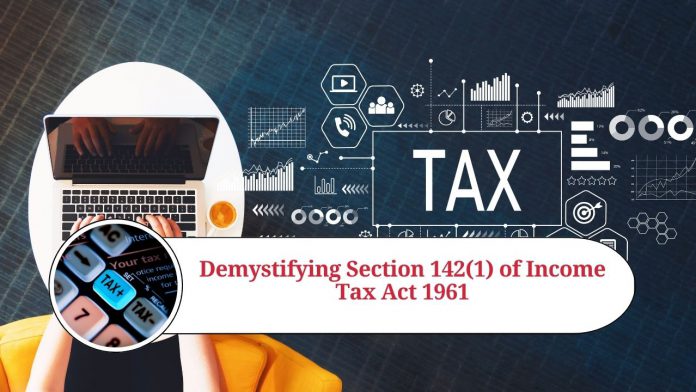Section 142(1) of Income Tax Act 1961: A Comprehensive Guide
Section 142(1) of the Income Tax Act 1961 provides powers to the Assessing Officer to conduct a tax audit, make necessary enquiries, and gather relevant information for assessment purposes. In this blog, we will discuss the different aspects of Section 142(1) of the Income Tax Act 1961, its provisions, and its implications.
Overview of Section 142(1)
Section 142(1) of the Income Tax Act 1961 provides powers to the Assessing Officer to conduct a tax audit of the taxpayer’s records and books of accounts to determine the accuracy of the tax returns filed by the taxpayer. The Assessing Officer may also gather additional information or make necessary enquiries to determine the tax liability of the taxpayer.
Provisions of Section 142(1)
Section 142(1) of the Income Tax Act 1961 provides the following provisions:
- The Assessing Officer can conduct a tax audit of the taxpayer’s records and books of accounts to verify the accuracy of the tax returns filed.
- The Assessing Officer can also gather additional information or make necessary enquiries to determine the tax liability of the taxpayer.
- The taxpayer is obligated to provide all the necessary documents and information requested by the Assessing Officer during the audit or enquiry.
- The Assessing Officer must provide a notice to the taxpayer before conducting the audit or enquiry.
- The Assessing Officer may also issue summons to the taxpayer or any other person to appear and provide information during the audit or enquiry.
Implications of Section 142(1)
The implications of Section 142(1) of the Income Tax Act 1961 are as follows:
- The Assessing Officer has extensive powers to conduct a tax audit, gather information, and make enquiries. This ensures that taxpayers are filing their tax returns accurately and paying the correct amount of taxes.
- Taxpayers must maintain proper records and books of accounts to avoid any discrepancies during the tax audit. Failure to maintain proper records may result in penalties or prosecution.
- Taxpayers must comply with the notices and summons issued by the Assessing Officer. Non-compliance may result in penalties or prosecution.
- Taxpayers may seek professional help to assist them during the tax audit or enquiry. Professional help can ensure that taxpayers comply with the legal provisions and avoid any penalties or prosecution.
Conclusion
Section 142(1) of the Income Tax Act 1961 provides extensive powers to the Assessing Officer to conduct a tax audit, gather information, and make enquiries. Taxpayers must maintain proper records and books of accounts to avoid any discrepancies during the tax audit. Taxpayers must also comply with the notices and summons issued by the Assessing Officer. Seeking professional help during the tax audit or enquiry can ensure that taxpayers comply with the legal provisions and avoid any penalties or prosecution.
Read more useful content:
- section 145 of income tax act
- section 10e of income tax act
- section 9 of the income tax act
- section 94b of income tax act
- section 206aa of income tax act
Frequently Asked Questions (FAQs)
- What is Section 142(1) of the Income Tax Act 1961?
Section 142(1) of the Income Tax Act 1961 provides powers to the Assessing Officer to conduct a tax audit, make necessary enquiries, and gather relevant information for assessment purposes.
- What is the purpose of Section 142(1) of the Income Tax Act 1961?
The purpose of Section 142(1) is to ensure that taxpayers are filing their tax returns accurately and paying the correct amount of taxes by allowing the Assessing Officer to verify the accuracy of tax returns and gather additional information.
- What is a tax audit?
A tax audit is an examination of a taxpayer’s financial records and books of accounts to verify the accuracy of tax returns filed and ensure compliance with tax laws.
- Who can conduct a tax audit under Section 142(1)?
The Assessing Officer has the power to conduct a tax audit under Section 142(1).
- Can a taxpayer refuse to provide documents or information during a tax audit or enquiry?
No, the taxpayer is obligated to provide all the necessary documents and information requested by the Assessing Officer during the tax audit or enquiry.
- What happens if a taxpayer does not comply with the notices or summons issued by the Assessing Officer?
Non-compliance with the notices or summons issued by the Assessing Officer may result in penalties or prosecution.
- Can a taxpayer seek professional help during the tax audit or enquiry?
Yes, taxpayers may seek professional help to assist them during the tax audit or enquiry to ensure compliance with legal provisions and avoid any penalties or prosecution.
- Is a tax audit mandatory for all taxpayers?
No, a tax audit is not mandatory for all taxpayers. It is conducted at the discretion of the Assessing Officer based on certain criteria, such as the taxpayer’s income or turnover.




















